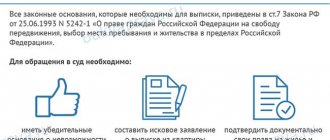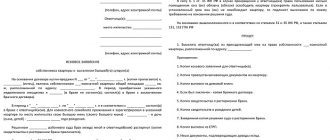Is it possible to expel a roommate from an apartment?
This question cannot be answered unambiguously. The fact is that forcibly deregistering a person, even if he is not the owner of the disputed apartment, is only possible with a court order in hand.
Various circumstances may provide grounds for filing an application with the court. Eg:
- the relationship between the former partners ceased and the need to live together disappeared;
- the man has not lived in the apartment for a long time, but refuses to voluntarily leave it;
- despite the fact that after the separation, the former cohabitants agreed to live together as neighbors, for more than six months the man has not paid his share of the utility bills;
- With his behavior, the person being discharged spoils the lives of other people living with him.
Features of the procedure
The procedure for discharging a cohabitant from a municipal apartment has its own characteristics. The problem is that cohabitants who rent such housing have equal rights to registration and residence. A citizen can be discharged from municipal housing only if there are compelling reasons.
The owner of municipal housing is the local administration. One of the spouses can only file a complaint with the territorial authority with a request to resolve the dispute. Pre-trial resolution of the dispute and filing a claim can only be carried out by the owner of the property.
Procedure
Having decided to evict a roommate from an apartment, first of all, you need to invite the person to a conversation and try, using reasonable, logical arguments, to convince him to check out and move out voluntarily. You can read about how to document this procedure here.
If the conversations lead nowhere, there is nothing left but to proceed with forced discharge through the court. In this case, it is necessary to act according to the following algorithm:
- we send the negligent partner a written notice of eviction, in which we warn the man that if he refuses to fulfill the requirements within the established time frame, you will file a claim in court with a request for forced discharge and eviction;
- we draw up an application, attach all the necessary documents to it and file a claim with the district court of general jurisdiction at the location of the disputed living space;
- We actively participate in all hearings, receive a court order and, on the basis of this document, discharge the cohabitant by submitting an application to the regional department of the Department of Internal Affairs of the Ministry of Internal Affairs of the Russian Federation.
Extract from a municipal apartment
There are two main types of apartments from which cohabitants have to be discharged and evicted - municipal and privatized. Municipal buildings, which will be discussed in this block, are not the property of residents. This is both a plus and a minus in terms of potential deregistration.
On the one hand, it will not be possible to use the basis that the cohabitant is not a relative. If he somehow registered in a municipal apartment, then he has the right to live here. On the other hand, the municipality (local administration) very closely monitors the fulfillment of tenants' obligations. In particular, payment of utility bills. And lastly, the administration directly deals with deregistration, which greatly simplifies the procedure for residents.
Procedure
- Select a suitable basis for forced discharge.
- Collect evidence.
- Send an application requesting expulsion and eviction to the administration, attaching evidence.
- Based on the documents received, the current problem is considered.
- If the problem is considered truly significant and suitable for discharge without consent, the administration independently goes to court.
- After receiving the appropriate decision, the person is discharged.
In this case, residents are only required to collect evidence and send it with an application to the administration. This is convenient, but the administration is not always ready to consider such applications. Sometimes you will have to send them repeatedly.
Documentation
To submit an application, you only need evidence. This could include certificates from the management company indicating the amount of debt of a particular tenant, police reports, extracts from the house register confirming the fact that the person actually lives at a different address, and so on. The specific list depends on what exactly is happening and on what basis they plan to evict the cohabitant.
In order to prepare truly relevant evidence that the local administration cannot ignore, it is recommended to seek the help of an experienced lawyer.
Expenses
Extract from a municipal apartment, taking into account the fact that residents will not be directly involved in the procedure itself, just as they do not have to go to court on their own, is absolutely free.
Deadlines
The timing of expulsion from a municipal apartment without the consent of a cohabitant depends almost entirely on the local administration. Residents have no influence or control over this. They can collect all the necessary evidence as quickly as possible and send an application demanding an extract to the administration, but representatives of the municipality will decide when to deal with this issue. As practice proves, on average, the entire procedure takes about 5-6 months or even more.
Describe the procedure
The discharge procedure is quite complex and consists of several points.
Pre-trial settlement
Even if you are sure that your request for voluntary discharge will be ignored by your cohabitant, you must submit it in any case. After all, later in court you can safely say that you did everything that depended on you to peacefully resolve the conflict and avoid litigation.
For this:
- We draw up the text of the notification in two copies, in which, in addition to the requirement, we indicate the grounds for its occurrence;
- we give one copy to our roommate, and on the second we ask him to sign for acceptance of his copy;
- if a man refuses to confirm in writing that the request for discharge has been served on him, the document can be served in front of witnesses or sent by registered mail with acknowledgment of receipt.
Going to court
Having received a refusal, begin preparing a package of documents for the court, taking into account the following nuances:
- the application must be submitted to the district court of general jurisdiction at the place of residence of the plaintiff or defendant (in your case, this will most likely be the same address);
- The court office accepts such claims, but before submitting documents, pay the state fee;
- the court has the right to refuse to accept the application, citing errors made in its preparation. To avoid such problems, it is better to use the help of a qualified lawyer when writing a document.
After the application is accepted, you will be notified of the date and time of the meeting, and the same information will be brought to the attention of the defendant.
After the preliminary hearing, if the court does not have additional questions on the merits of the case, a main hearing will be scheduled at which the court will make a decision and make a ruling.
Extract from the migration authority
With the document received in court, go to the migration authority. There, on a special form (form No. 6), write an application to remove the man from the registration register at the place of residence. The presence of the cohabitant at the time of discharge is not required; he will be deregistered automatically based on a court decision, after which the registration stamp in his passport will be considered invalid.
When the defendant is successfully deregistered, he must move out of the occupied living space at the time set by the court. If, even with a copy of the resolution in hand, a man is in no hurry to move, contact the bailiffs for help, they will come and forcibly evict the offender. You can learn about how eviction occurs after a court decision in this article.
Attention! If you do not want to be prosecuted, do not force an unwanted tenant to evict by force or through blackmail.
Statement of claim
The statement of claim can be written by hand or typed and printed on a computer. In order for a document to be accepted by the court, it must contain the following information:
- name of the court;
- surname, first name, patronymic (in full) of the plaintiff;
- contact details of the plaintiff (address, telephone);
- description of the problem;
- links to regulations that confirm your case;
- a clearly formulated request to the court;
- list of documents attached to the application;
- date and signature of the plaintiff.
When describing the essence of the issue, try to express your thoughts as less emotionally as possible, do not forget that each of your arguments must be supported by evidence.
Documentation
The package of documents to the court for the forced discharge of a cohabitant must consist of:
- copies of your passport;
- statement of claim;
- documents of title to the apartment, for example, a deed of gift or a purchase and sale agreement;
- certificates of home ownership;
- certificates about all persons registered in the apartment;
- all available evidence of the illegality of the defendant’s residence in the disputed apartment (written witness statements, copies of protocols on administrative offenses, information about the defendant’s ownership of other living space, and so on);
- receipts for payment of state fees.
Deadlines
Unlike voluntary deregistration, which usually lasts no more than three days, forcible deregistration of a cohabitant may take several months, namely:
- consideration of the application by the court office and acceptance of it for work - 5 working days;
- the trial in the court of first instance will last approximately 2 months (possibly longer);
- the extract itself from the moment of submitting the corresponding application to the Department of Internal Affairs of the Ministry of Internal Affairs of Russia - another 3 working days.
That is, in the best case, the cohabitant will be discharged after 2 -2.5 months. Plus, it may take some more time for his forced eviction by bailiffs.
Nuances of discharge of a roommate
Depending on the type of residential property in dispute, a number of features must be taken into account.
From a council apartment
In most cases, an application to the court for forced deregistration must be submitted on behalf of the owner of the apartment, that is, from the administration of the locality on whose territory the disputed object is located.
In fact, former cohabitants registered and living in the same municipal apartment have equal rights to it, therefore, without sufficiently compelling reasons for eviction, such as a proven move of a person for permanent residence to another apartment that is his private property, it is not worth even starting the procedure.
In addition, if a man is disabled in groups 1-2, it will be possible to discharge him through the court only if he is simultaneously provided with other housing.
From privatized
It is much easier to remove a roommate from your own privatized apartment. It is enough to indicate in the application that you solely own the apartment and, due to disagreements with the defendant, do not want to live together with him. In this case, it is not at all necessary to prove that the defendant has alternative housing. But remember: if the defendant previously refused to participate in privatization in your favor, he automatically received the right to lifelong residence in the apartment, and not a single court will allow him to be discharged from there “to nowhere.”
In addition, sometimes the judge may postpone the discharge and eviction of the defendant for several months if the man proves that at the moment he has nowhere to move, since there is not enough money even for rented housing.
Grounds for an extract - we build a chain of articles of law
- There is no such thing in law as a common-law husband, common-law wife, cohabitant or cohabitant. Only a registered marriage gives rise to marital and family relations - clause 2 of Art. 1 and Art. 10 IC RF. A common-law husband/wife does not have the status of a family member or relative; they are considered strangers.↓
- When the owner of an apartment registers a common-law husband/wife with him, it is considered that they have entered into an agreement between themselves for the free use of the apartment orally - clause 2 of Art. 30 LC RF and clause 1 art. 689 of the Civil Code of the Russian Federation. That is, the owner allowed the common-law husband/wife to live and use the apartment for an indefinite period.↓
- The owner has the right to unilaterally terminate oral agreements with strangers to live in his apartment - clause 1 of Art. 699 Civil Code of the Russian Federation.↓
- Registration of a common-law husband/wife violates the owner’s rights to freely dispose of the apartment, therefore he has the right to demand that this violation be eliminated - Art. 304 Civil Code of the Russian Federation.↓
- In addition: even if the apartment was purchased in a civil marriage (although there is no such thing), it is not jointly acquired property. Only registered spouses have a regime of joint ownership - Art. 256 Civil Code of the Russian Federation, Art. 33 and art. 34 RF IC.
It makes no difference whether the common-law husband/wife paid for utilities. The main thing is to inform that the oral accommodation agreements have been terminated.
Arbitrage practice
In most cases, when considering cases of forced deportation of cohabitants, the courts side with the plaintiffs, especially when it comes to privatized housing.
Example. Citizen Ivanov, having moved to the regional center from the village, met citizen Sidorova, after some time the couple began living together in the woman’s privatized apartment. To avoid problems with employment, it was decided to register Ivanov at his new place of residence. The cohabitants were in no hurry to officially register their relationship. After 2 years, due to Ivanov’s frequent drinking, the couple’s relationship completely deteriorated. Sidorova asked the man to move out and voluntarily check out of her apartment. Having received a refusal, she filed an application with the court, attaching to the document written testimony from neighbors and copies of decisions about the repeated administrative violations of her cohabitant.
The defendant did not consider it necessary to appear at either the preliminary or the main hearing, although he was notified in advance of the date and time of their holding. Since Ivanov had no valid reasons for missing the hearings, the court considered it possible to consider the case in his absence. Sidorova's demands were satisfied. After receiving the decree, the woman without any problems discharged her partner through the Department of Internal Affairs of the Ministry of Internal Affairs of Russia. There was no need to contact the bailiffs to forcibly evict the defendant; the former cohabitant, a few days after receiving a copy of the court decision by mail, moved to a rented apartment.
What if a common-law husband or wife lives in an apartment?
It makes no difference whether he lives or not. This fact does not affect the court's decision in any way. In most cases, the court does NOT leave registration to strangers for a certain period of time.
There are, of course, minor differences only in the judicial procedure. The main thing here is to competently draw up a statement of claim and prepare for court. Read about this below in my detailed instructions.
Our law office "Bessonov and Partners" offers residents of Moscow or the region. We will take on all the possible work - we will draw up a correct statement of claim, collect all the necessary documents and submit them to the court. You will not need to come to court hearings; the office's lawyer will participate in them and will do everything possible to win the case. At the end of the trial, we will bring you a copy of the court decision.
We have been working in the field of court records since 2008 and have won 84% of court cases.
The cost of the service is 60 - 90 thousand rubles. For visitors to this site there is a discount of 5% to 10%. To receive it, say that you came from the website “Prozhim.com”. For all questions and for a free consultation, call 8 (495) 642-31-96 (daily from 9:00 to 21:00 Moscow time / only for residents of Moscow and the region).










